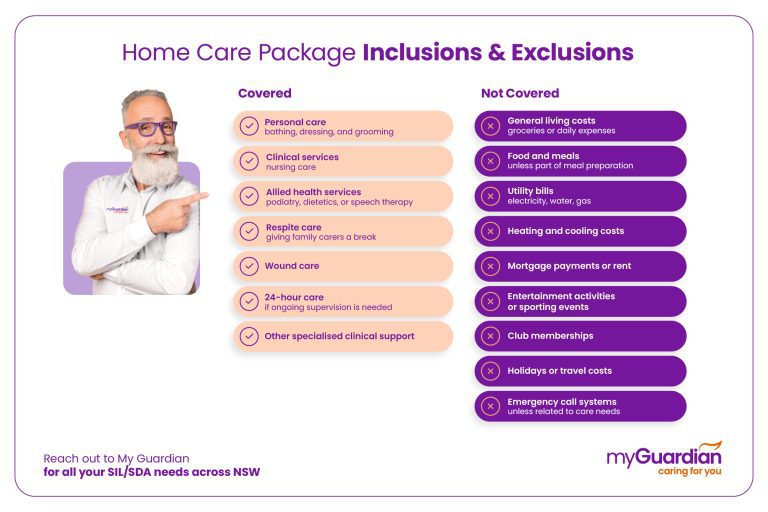Everything About Home Care Solutions for People With Disabilities: NDIS Registered Assistance
Home treatment solutions under the NDIS play a crucial function in sustaining individuals with disabilities. These services are made to enhance everyday living through customized support, ranging from individual like mobility support. Understanding how to browse these choices can be complicated. This summary explores the various aspects of NDIS home treatment, from readily available solutions to the selection of providers, highlighting crucial factors to consider for those looking for assistance. The journey toward equipped care starts here.
Understanding the NDIS and Its Purpose
The National Special Needs Insurance System (NDIS) acts as a transformative structure developed to supply support and services for individuals with disabilities. Established to enhance the top quality of life and warranty equitable access to crucial resources, the NDIS equips participants by offering personalized plans customized to their one-of-a-kind requirements. It intends to foster freedom, enabling individuals to seek their individual objectives and aspirations.Through an organized approach, the NDIS allots financing for different assistances, consisting of education, work support, and neighborhood participation. This comprehensive system not only concentrates on prompt care yet additionally stresses lasting developing end results. By promoting option and control, the NDIS urges individuals to pick their preferred solution companies, guaranteeing that care lines up with their preferences and values. Eventually, the NDIS stands for a significant dedication to enhancing the lives of people with specials needs, fostering inclusivity, and constructing a more helpful society.
Kinds of Home Treatment Solutions Available
Various types of home care services deal with people with handicaps, primarily concentrating on personal care help and break treatment options. Personal treatment help gives crucial support with day-to-day activities, while break treatment offers momentary alleviation for main caretakers. Recognizing these solutions is vital for making sure the well-being of both people with specials needs and their family members.
Personal Treatment Aid
While steering day-to-day live can provide obstacles for people with disabilities, personal treatment aid offers important assistance customized to their distinct demands. This sort of home care service incorporates a variety of tasks made to advertise freedom and improve lifestyle. Personal care assistants help with day-to-day jobs such as bathing, clothing, brushing, and toileting, making sure individuals preserve individual health and convenience. They might also aid with meal preparation, medication administration, and mobility support. By providing customized care, these experts equip individuals to involve more totally in their day-to-day regimens and social activities. Overall, personal care help plays a significant role in promoting dignity and autonomy for those with disabilities, allowing them to prosper in their home environment.

Break Care Options
Reprieve care works as an important source for families and caretakers of people with handicaps, supplying temporary alleviation from the needs of daily caregiving. This sort of service can take numerous kinds, consisting of at home respite treatment, where skilled experts check out the home to assist with care tasks. Conversely, family members might opt for facility-based break treatment, where individuals get treatment in a customized setting, enabling caregivers to relax. In addition, some companies use emergency respite solutions for unanticipated circumstances. These alternatives not just assist alleviate caregiver anxiety however also promote the wellness of individuals with disabilities by providing them brand-new experiences and social interaction. On the whole, reprieve treatment plays a vital function in sustaining both caretakers and those they take care of.

How to Accessibility NDIS Home Treatment Solutions
Accessing NDIS home treatment solutions involves comprehending the qualification requirements stated by the National Impairment Insurance Policy System. People should browse an organized application process to secure the necessary support tailored to their requirements. This area will certainly make clear both the qualification requirements and the actions included in requesting solutions.
Qualification Criteria Explained
To receive NDIS home treatment services, individuals should fulfill certain qualification standards that examine their needs and circumstances. Candidates have to be aged between 7 and 65 years and have a permanent and substantial disability that impacts their capacity to perform daily tasks. Additionally, they need to be an Australian citizen, a long-term resident, or hold a Protected Unique Group Visa. The NDIS requires proof of the impairment, generally through clinical analyses or reports. Moreover, individuals should demonstrate that they need assistance to join social and financial life. These requirements ensure that solutions are routed towards those that genuinely need assistance, advertising self-reliance and enhanced lifestyle for people with disabilities.
Application Process Actions
Can I Select My Very Own Assistance Workers With NDIS?
The private made inquiries whether they can select their browse this site own support employees under the NDIS structure. Normally, participants have the versatility to select support employees, cultivating individualized care that aligns with their particular demands and choices.
What Occurs if My Requirements Change After Obtaining Support?
They must communicate these changes to their solution company if a person's demands change after getting support. Changes can be made to the care strategy, making sure that the support stays efficient and relevant for their circumstances.

Exist Limits on The Amount Of Hours of Care I Can Obtain?
The individual made inquiries concerning potential limits on the variety of care hours received. Generally, such limitations might exist based upon certain plans or funding plans, highlighting the significance of reviewing guidelines and arrangements regularly.
Can I Make Use Of NDIS Funding for Home Adjustments?
The inquiry of using funding for home modifications arises often. Generally, people might use NDIS funding for required alterations to their homes, guaranteeing ease of access and safety and security, set upon meeting certain qualification requirements and guidelines.
How Do I Manage Grievances Regarding My Home Treatment Services?
To resolve problems regarding home care solutions, people should initially document their worries. After that, they can communicate straight with their service supplier, looking for resolution, or intensify the concern to pertinent oversight bodies if essential. Home treatment services under the NDIS play an essential duty in sustaining people with handicaps. Various kinds of home treatment solutions provide to people with impairments, mainly focusing on individual treatment help and reprieve care choices. home care package providers. Individual care help supplies vital assistance with daily activities, while break care offers short-term alleviation for key caretakers. Households might decide for facility-based reprieve treatment, where people get care in a specific setting, permitting caretakers to take a break. Just how can families effectively handle the economic elements of home treatment services for people with handicaps?